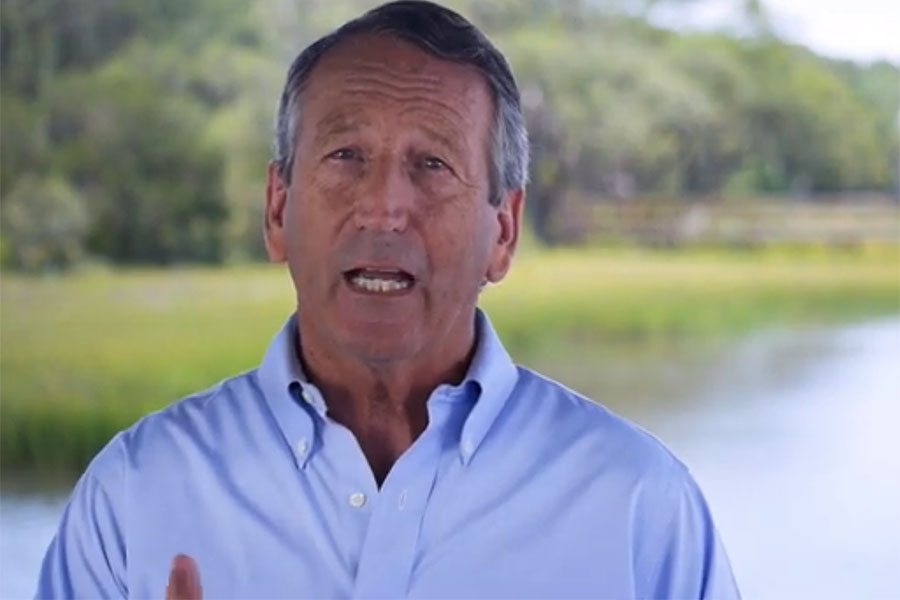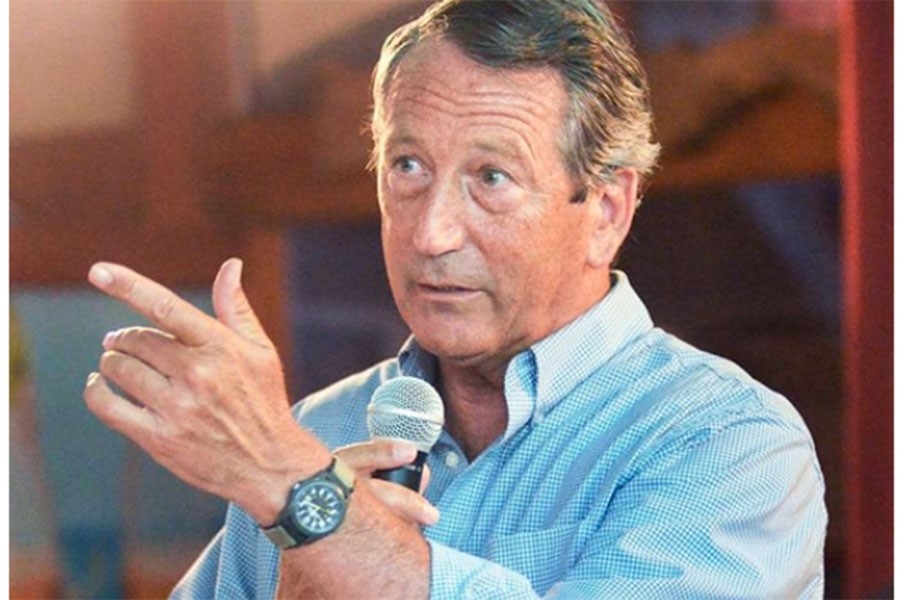Former South Carolina Governor Mark Sanford discusses why Oregon Republicans should choose him for the party’s nomination.
Amid a presidency rocked by scandal, controversyand high-level departures, three Republican legislators have emerged to challenge Donald Trump for their party’s presidential nomination this November.
Several states, including Nevada and Alaska, have seen their state G.O.P cancel primaries in a show of support for the president, who faces impeachment , at least in the House of Representatives.
Oregon is not one of those states, and will hold a primary to determine the party’s nominee.
Though often considered as a shoe-in for the nomination, the president’s recent struggles have left his popularity diminished among Republicans. Twelve percent say they want to see the president impeached from office.
Former Governor of South Carolina Mark Sanford is one of three challengers for the nomination, alongside former Massachusetts Governor Bill Weld and Illinois Congressman Joe Walsh.
Sanford says Trump has derailed the party’s values of fiscal responsibility and freedom of enterprise. He wants Oregon’s Republicans to know there is another option at the ballot box.
Why are you challenging the president for your party’s nomination?
I think the Republican Party is going in the wrong direction under his leadership. I think we need to have an earnest conversation among Republicans about what it means to be a republican.
I think we’ve lost our moorings on what our values are in terms of what we spend, on protectionism versus competition and engagement versus isolationism.
We’re a nation of laws and institutions not of men. When you have the president call the chairman of the Federal Reserve an enemy of the state, whether you like him or not, it pulls apart the glue that holds our country together.
You diverge from the president on trade policy. How would you change?
A tariff is a tax, period. When the president talks about how other people are going to pay for our tariffs, he’s wrong. Those tariffs are going to be passed on to the consumer. They are taxes on Americans.
The Wall Street Journal reports a whole percentage of economic growth this year has been lost due to trade uncertainty. People don’t know what’s coming so they don’t want to invest, whether that’s in a hazelnut farm in Oregon or a factory in Ohio.
His approach to trade doesn’t win you many trade partners in the global supply chain. While some people might want to go back to the 1950s, that’s no longer the world we live in.
You have said the president has misused his powers. How so?
The president used Section 232, which is a national defense measure, to put tariffs on the Canadians.
The idea that Canada is a national security threat is a joke, but that’s what he used for his steel import tariffs. We are a nation of laws, not of men.
How would your approach to trade do things differently?
Tariffs are blunt instruments and effective only under certain circumstances. If I were ever to restrict trade, I would use a multilateral approach. If you want to punish a nation economically you need to have [the rest of the world] on board.
Otherwise you get at what happened in Cuba, where unilateral embargo just kept Castro in power because he could blame the U.S. for everything wrong in his country.
I think we need to deal with China with something like the Trans Pacific Partnership, not what we’ve currently got going on.
You’ve said you believe the science behind climate change. What are your views on how Washington should approach the issue?
I think we need to take another look at nuclear energy. We have really stymied our ability to create nuclear energy in this country. It is nearly impossible to get new reactors built.
I support nuclear because I think we need to look at an alternative energy source that can meet our needs in the here and the now. I believe in renewables, but I think we need a new power source that can realistically meet the energy needs of our economy.
Nuclear energy isn’t perfect but it’s better than all of the above.

Credit marksanford.com
Oregon’s governor supports cap-and-trade legislation despite a bill that would put a price on carbon failing to pass this year. The legislation is likely to be reintroduced. In a hypothetical Supreme Court battle over a law like the one Oregon is considering, where would you stand?
The difficulty with cap and trade is to create a market that works and make sure it’s not just an excuse to raise taxes.
I would say I’m open to the idea, but if you look at my voting record I’m leery of increasing the overall tax burden for Americans.
I am for capturing externalities that aren’t captured by current market forces. If you’re a classic conservative, you say: “My rights go until they start infringing on yours.” There’s nothing more fundamental than the air that we breathe.
I consistently diverted green on energy issues while in Congress and during my second run for governor I was endorsed by the Sierra Club, which is unheard of for Republicans.
Oregon is a state that has been hit hard by the opioid epidemic. What are your plans for solving this public health crisis?
I think we’ve thrown a lot of money at the opioid problem. As a federalist, I’m more for giving states their own flexibility for how they deal with this crisis. The opioid epidemic probably looks a lot different in Oregon than the beaches of South Florida.
When you look at Medicaid funding there is a surprising degree of handcuffs placed on whoever got the money. I would give states more flexibility to use federal funding as they see fit.
Oregon has ended prohibition on cannabis. As president, what would be your approach to states that have legalized?
I believe if Oregon votes to legalize marijuana, then marijuana companies in Oregon should have access to the federal banking system. It’s up to the state to decide what’s a legal business.
If you’re a consistent Jeffersonian conservative, you have to believe that not all problems can be solved by the federal government.
We are a quilt work of state experiments who get to try things. Some things will work, some things won’t, but we can end up with better federal policy if we can have a marketplace of ideas and approaches.
Industrial automation is consuming jobs in Oregon, especially in rural areas. How would you approach jobs lost in an increasingly mechanized economy?
We all ought to subscribe to the notion that learning is a lifelong process. We’re not in our grandparents’ time where you work for one company and get a gold watch after 40 years.
I believe government has a role in giving people the tools to transition, but it shouldn’t be a buyout.
We have a lot of retraining programs in our community colleges across the country. I think the federal, state and local governments all have roles in helping people to transition.
To subscribe to Oregon Business, click here.







